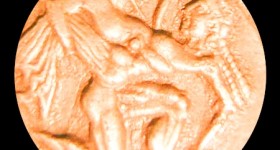Manolis is asking a very demanding question today. Are you ready to sharpen your knowledge?
Nowadays philologists and historians are too many in Greece and many of them are unemployed. Perhaps they should pursue a different type of career, as this ancient philologist did. He became the tyrant of an island! Who was he?
Economic historian and numismatic consultant





This is far removed from my are of knowledge(Renaissance Italy), but to hazard a try, I will put down Dionysius I of Syracuse!
I’m looking forward to hearing the answer
H
Perhaps Douris of Samos, a historian who also wrote on tragedy and art?
No and No. Gosh! This is difficult!
Is it Themison of Cyprus to whom Aristotle addressed the Protreptikos?
We propose Cleobulus of Lindus…although we are not sure about the expression island… and philologist
This quiz has been on my mind for 3 months! To be honest, I thought that Constantina would reject it, as she usually wants me to ask easier questions. I too think it’s difficult, so let me give you a few hints. By “island” I mean… a regular island! Not a very big one like Sicily, but an island anyway. The term “philologist” is used more or less in the modern sense of the word. This person would be called a “grammaticus” in antiquity. And let me help you by saying that he became tyrant thanks to the approval of a very powerful man of his age.
How about Maiandrios, the grammatistes (secretary) of Polykrates?
Herodotos reports that after Polykrates’ murder Maiandrios ruled Samos for a while. It has been suggested that Maiandrios might have conspired with the Persian satrap Oroites to eliminate Polykrates and seize power on the island.
Sorry Yianni,
we are still looking for a philologist and not a secretary!
One more thing: Before leaving for his fateful meeting with Oroites, Polykrates entrusted the government of Samos to Maiandrios. In this fashion the powerful tyrant directly or/and indirectly opened the way for Maiandrios’ rise to power.
This is a tricky one! If I may be permitted a second attempt – I’d like to submit Pittacus of Mytilene.
H
Nikias.
I will give you one more clue. A famous (infamous?) Roman may have been involved.
That’s what I’m saying. Nikias (of Kos). Protected by Antonius.
Peter K,
of course, you are correct. I know that Manolis had someone else in mind (what is it with Roman politicians and Greek philologists-tyrants?) but Nikias of Kos certainly fits the profile. As far as I know, he is mentioned in Suetonius as a man of learning and someone who wrote a critique on Lucretius. He is otherwise known as Curtius Nicias.
With regard to Curtius Nicias, Suetonius (De grammaticis et rhetoribus 14.3) refers to his work “de Lucilio”, not Lucretius. His identification with the tyrant of Kos seems to be regarded as possible but not certain.
K. Buraselis, in his book Kos between Hellenism and Rome, Philadelphia 2000, pp. 25-65 (passim), esp. p. 30, accepts the identification of the grammarian Curtius Nicias with the tyrant, commenting also on the numismatic evidence (op. cit., pp. 31-37), as well as on the literary and other testimonia (p. 37ff.).
Thanks for the reference.
It is Nicias. The identification of the tyrant with the philologist is usually accepted.